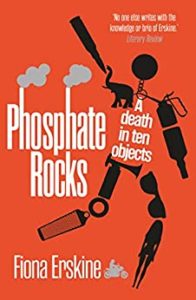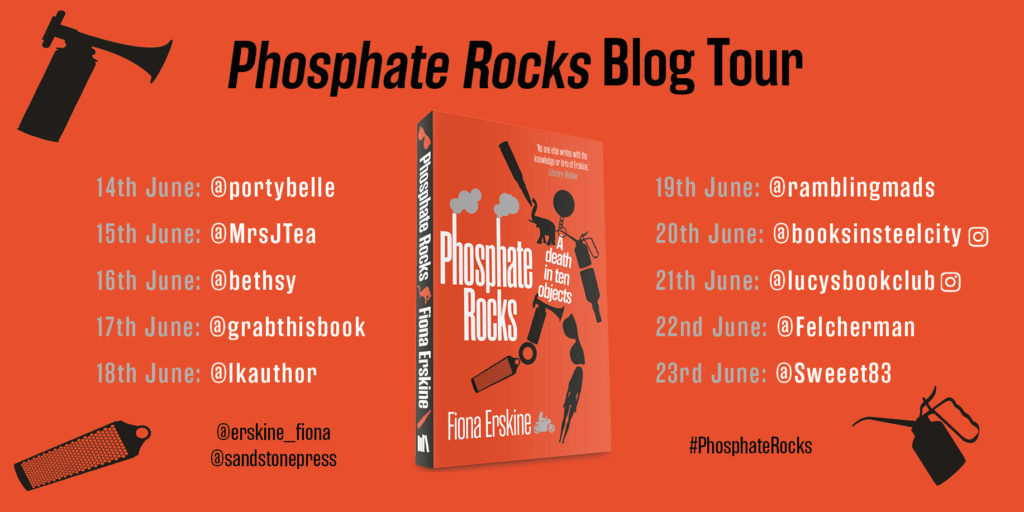Phosphate Rocks – Fiona Erskine
As the old chemical works in Leith are demolished a long deceased body encrusted in phosphate rock is discovered. Seated at a card table he has ten objects laid out in front of him. Whose body is it? How did he die and what is the significance of the objects?
I received a review copy from the publisher through Netgalley.
It doesn’t matter what you may think this book is about. If you read the brief, teasing blurb above that’s only going to scratch the surface of the story in Phosphate Rocks.
As I read the book I tweeted a few times that I had no idea how I was going to review it. That hasn’t changed, I am not sure how to succinctly articulate the utter pleasure I experienced reading Phosphate Rocks. Or the anguish, the horror, the fascination or the fun. This book had it all and, when it was done, I wasn’t. I wanted more. I wanted to keep reading about these remarkable overlooked heroes of their craft.
So what’s it about?
 Well there’s a dead body in an old chemical plant in Leith (Edinburgh). The site is no longer active but before everything closed down it seems, somehow, a huge shroud of phosphate rock encased a work hut. Inside that hut was a dead body sat at a table. Laid out on the table in front of the corpse were ten objects which the police hope John Gibson, former shift manager at the site, can use to identify the deceased.
Well there’s a dead body in an old chemical plant in Leith (Edinburgh). The site is no longer active but before everything closed down it seems, somehow, a huge shroud of phosphate rock encased a work hut. Inside that hut was a dead body sat at a table. Laid out on the table in front of the corpse were ten objects which the police hope John Gibson, former shift manager at the site, can use to identify the deceased.
Sitting in a police station, years after his plant had closed down, John identifies each of the ten objects and tells Detective Inspector Rose Irvine the story behind each item. With each passing object the reader gets to know more about the men that worked the site, the work they undertook and how chemicals and materials from around the world would pass under the nose of these Edinburgh workers.
Also filling in the reader with background information is author, Fiona Erskine, who gives each object a quirky and fascinating science lesson. You learn about chemicals, reactions, inventions and discoveries. Reading this book taught me how chemicals move around the world, how they need carefully stored and cared for and how it’s the plant workers that know best how to keep a busy chemical site ticking over – not the managers, chemists or owners. It may not sound like slipping chemistry learning into a crime story could be fun or engaging but it is utterly absorbing (though Fiona will likely correct me on what absorption actually is).
 The stories behind each of the objects are wonderful. Although this book is a work of fiction I am 100% convinced that many (if not all) of the stories are entirely anecdotal and based on actual events from the site. Why tie a long string around the neck of a whisky bottle? Who had the best dressed Barbie Doll in Scotland? Why should you not hit a pipe with a hammer and…is that an author cameo we see before us? If many events in the book are indeed based on actual events it may go a long way towards explaining why the book is so engaging. Nothing feels forced, overdone or over-exaggerated. The guys (and in the main it is guys) working on the site all feel utterly real and entirely plausible. I defy you not to warm to them.
The stories behind each of the objects are wonderful. Although this book is a work of fiction I am 100% convinced that many (if not all) of the stories are entirely anecdotal and based on actual events from the site. Why tie a long string around the neck of a whisky bottle? Who had the best dressed Barbie Doll in Scotland? Why should you not hit a pipe with a hammer and…is that an author cameo we see before us? If many events in the book are indeed based on actual events it may go a long way towards explaining why the book is so engaging. Nothing feels forced, overdone or over-exaggerated. The guys (and in the main it is guys) working on the site all feel utterly real and entirely plausible. I defy you not to warm to them.
The true hero of the piece is John Gibson. He is taken on a journey back through his working life and the stories he tells DI Irvine bring back memories of old colleagues – some more fondly remembered than others. John and DI Irvine are a charming pairing through the story too their conversations, some of which take place away from the police station when Irvine tracks him down to his favourite restaurant, are a cautious but intricate dance. Neither party is willing to overshare but both appear to crave more knowledge about the other.
 Phosphate Rocks is a crime story. There is a dead body, there are clues to help the investigators determine his identity and there is a man helping police with their enquries at the police station. But Phosphate Rocks is so much more. It is a story of a life (John Gibson), of many lives, of a plant that no longer dominates its corner of Leith and of the men who for years kept that plant ticking over. Clever men, inventive men, hard men and men with secrets. But I felt Phosphate Rocks is also a love story. I read of a time now gone which is much missed, a love of science and method and process and of low paid staff performing dangerous and skilled work. An affection of the cameraderie, the respect for John Gibson and the responsibility he held for the staff on his shift. It’s funny then it’s tragic and I want you all to read this story too.
Phosphate Rocks is a crime story. There is a dead body, there are clues to help the investigators determine his identity and there is a man helping police with their enquries at the police station. But Phosphate Rocks is so much more. It is a story of a life (John Gibson), of many lives, of a plant that no longer dominates its corner of Leith and of the men who for years kept that plant ticking over. Clever men, inventive men, hard men and men with secrets. But I felt Phosphate Rocks is also a love story. I read of a time now gone which is much missed, a love of science and method and process and of low paid staff performing dangerous and skilled work. An affection of the cameraderie, the respect for John Gibson and the responsibility he held for the staff on his shift. It’s funny then it’s tragic and I want you all to read this story too.
Phosphate Rocks, currently my book of the year. It will take something incredible to top this one.
Phosphate Rocks is published by Sandstone Press and is available from today in paperback and digital format. You can get your copy here: https://www.amazon.co.uk/gp/product/B08TR21QGZ/ref=dbs_a_def_rwt_bibl_vppi_i1

